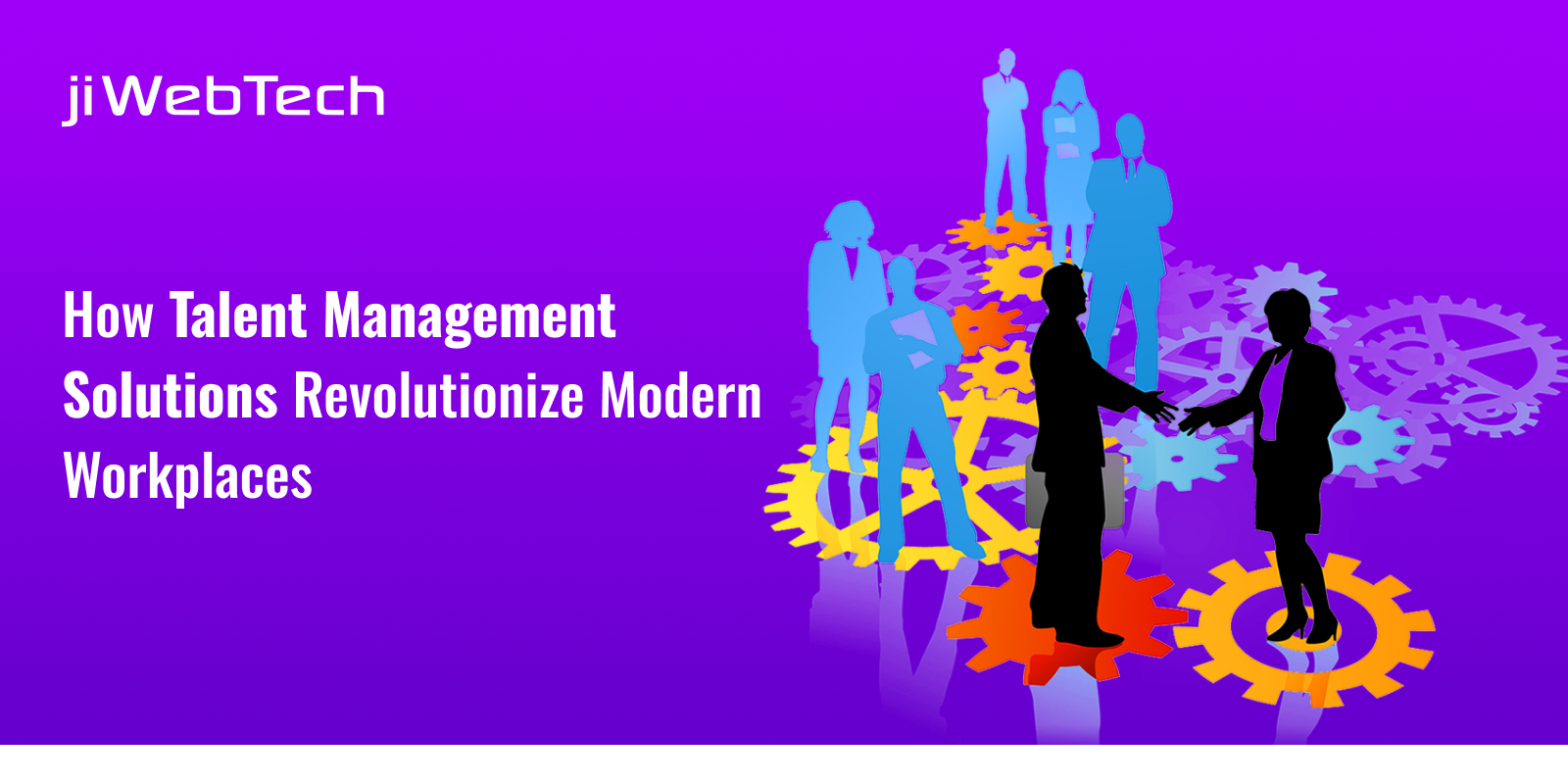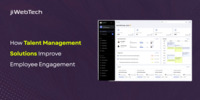- Jan 17, 2025
- Talent Management
- 1854
Share this post on:

In the contemporary business environment, the importance of effective talent management cannot be overstated. Organizations are increasingly recognizing that their success hinges on their ability to attract, develop, and retain top talent. Talent management solutions have emerged as critical tools that not only streamline HR processes but also enhance employee engagement and productivity. This blog will delve into how these solutions are revolutionizing modern workplaces, highlighting key features, benefits, and best practices for implementation.
The Evolution of Talent Management
Talent management has evolved significantly over the years. Traditionally, HR functions were often reactive, focusing primarily on recruitment and compliance. However, the advent of technology and changing workforce dynamics have shifted this paradigm towards a more proactive and strategic approach. Today, talent management encompasses a holistic view of the employee lifecycle—from recruitment to development, performance management, and succession planning.
Key Features of Talent Management Solutions
To understand how talent management solutions are transforming workplaces, it is essential to explore their key features:
1. Comprehensive Talent Acquisition Tools
Modern talent management solutions provide robust tools for talent acquisition. These include:
• Automated Job Posting: Streamlines the process of posting job openings across multiple platforms.
• Resume Screening: Utilizes AI algorithms to filter resumes based on specific criteria, ensuring that only qualified candidates are considered.
• Interview Scheduling: Automates scheduling interviews with candidates to save time for HR teams.
These features not only enhance efficiency but also improve the quality of hires by ensuring a better fit between candidates and organizational culture.
2. Effective Onboarding Solutions
An effective onboarding process is crucial for new hires to acclimate quickly. Talent management solutions offer:
• Digital Onboarding Checklists: Ensure all necessary paperwork is completed before the employee’s first day.
• Interactive Training Modules: Provide new hires with essential information about company culture and policies through engaging training sessions.
By facilitating a smooth transition for new employees, organizations can enhance retention rates from the outset.
3. Performance Management Features
Continuous performance management tools are integral to aligning individual performance with organizational goals. Key components include:
• Goal Setting Frameworks: Allow employees to set measurable objectives aligned with organizational targets.
• Regular Feedback Mechanisms: Facilitate ongoing discussions between managers and employees regarding performance expectations.
This shift from annual reviews to continuous feedback fosters a culture of accountability and growth.
4. Learning and Development Platforms
Talent management solutions often include learning management systems (LMS) that provide personalized learning experiences. These platforms offer:
• Access to a wide range of training materials.
• Support for skills gap analysis.
• Promotion of ongoing professional growth through various learning modalities, including e-learning and virtual classrooms.
By investing in employee development, organizations can cultivate a skilled workforce ready to meet evolving business challenges.
5. Succession Planning Tools
Succession planning is critical for leadership continuity within organizations. Effective talent management solutions enable:
• Identification and nurturing of high-potential employees for future leadership roles.
• Creation of customized development plans that prepare individuals for advancement.
This proactive approach ensures that organizations are equipped with capable leaders for the future.
Benefits of Implementing Talent Management Solutions
The adoption of talent management solutions yields numerous benefits for modern workplaces:
1. Enhanced Employee Engagement
Engaged employees are more productive and committed to their work. Talent management solutions help create a positive work environment that fosters engagement through personalized development opportunities and recognition programs.
2. Improved Retention Rates
Organizations that invest in employee development and career growth tend to retain their top performers. By providing clear pathways for advancement and continuous learning opportunities, companies can significantly reduce turnover costs.
3. Increased Productivity
Aligning employee skills with organizational goals enhances overall productivity. Talent management solutions facilitate this alignment by providing data-driven insights into workforce capabilities and performance trends.
4. Better Recruitment Outcomes
Streamlined hiring processes ensure that organizations attract the right candidates who fit their culture and values. By utilizing advanced analytics in recruitment strategies, companies can make informed decisions that lead to better hiring outcomes.
Challenges in Talent Management
While the benefits are substantial, organizations may encounter challenges when implementing talent management solutions:
1. Resistance to Change
Employees may be resistant to new technologies or processes introduced by talent management systems. It is crucial to communicate the benefits clearly and involve employees in the transition process.
2. Integration with Existing Systems
Integrating new talent management software with existing HR systems can be complex. Organizations must ensure compatibility and streamline data flow between systems to maximize efficiency.
3. Data Privacy Concerns
As talent management solutions rely heavily on data analytics, organizations must navigate data privacy regulations carefully. Ensuring compliance while leveraging data insights is essential for maintaining trust among employees.
Best Practices for Implementing Talent Management Solutions
To successfully implement talent management solutions in your organization, consider the following best practices:
1. Engage Leadership Support
Securing buy-in from leadership is crucial for championing talent management initiatives across the organization. Leaders should actively participate in the implementation process to demonstrate commitment.
2. Communicate Transparently
Keep employees informed about changes in talent management practices and how these changes will benefit them. Transparent communication fosters trust and encourages acceptance of new processes.
3. Personalize Development Opportunities
Tailor training programs to meet individual employee needs while aligning them with organizational goals. Personalized development plans enhance engagement and motivation among employees.
4. Monitor Progress Regularly
Regularly assess the effectiveness of your talent management initiatives through feedback surveys, performance metrics, and retention rates. Be prepared to adjust your strategies based on what is working or not working.
The Future of Talent Management Solutions
As we look ahead, several trends are shaping the future of talent management:
1. AI-Powered Analytics
Leveraging artificial intelligence enables organizations to gain deeper insights into employee performance trends and skill gaps. AI-driven analytics will play an increasingly vital role in informing talent strategies.
2. Remote Work Adaptations
As remote work becomes more prevalent, talent management solutions must adapt to support distributed teams effectively. This includes developing tools that facilitate collaboration and communication among remote employees.
3. Employee Experience Focus
Organizations are prioritizing employee experience by creating personalized work environments that cater to individual preferences. This trend emphasizes the importance of well-being initiatives and flexible work arrangements.
4. Skills-Based Hiring and Development
Traditional qualifications will take a back seat as companies prioritize identifying specific skills needed for evolving business needs. Skills-based hiring will become central to recruitment strategies as organizations seek adaptable talent.
Conclusion
Talent management solutions are revolutionizing modern workplaces by transforming how organizations attract, develop, and retain their workforce. By leveraging technology-driven insights and fostering a culture of continuous learning, businesses can create an environment where employees thrive, leading to sustained success in an ever-changing landscape.
As organizations continue to evolve their talent strategies in response to emerging trends, those that embrace innovative talent management practices will be better positioned to navigate challenges and seize opportunities in the future workforce landscape. Invest in talent management solutions offered by jiWEbTech and improve HR processes. Contact us today and take a step forward toward a successful business.









